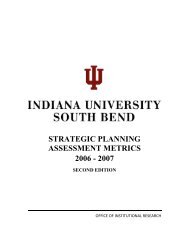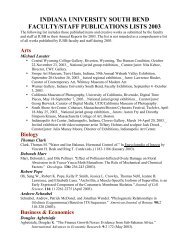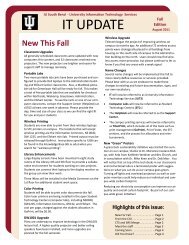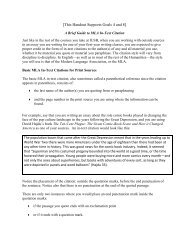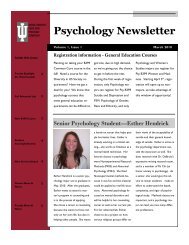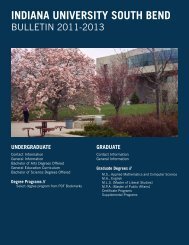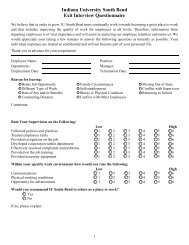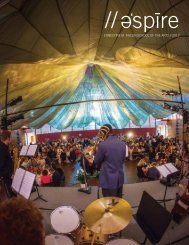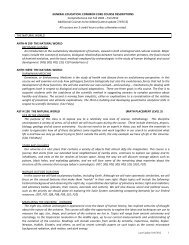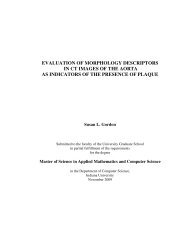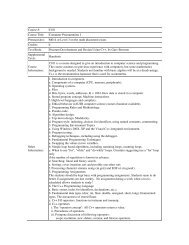Current version - Indiana University South Bend
Current version - Indiana University South Bend
Current version - Indiana University South Bend
You also want an ePaper? Increase the reach of your titles
YUMPU automatically turns print PDFs into web optimized ePapers that Google loves.
3863 IU SOUTH BEND COURSE DESCRIPTIONS<br />
PSY-P 403 NonExperimental Research Methods<br />
in Psychology (3 cr.)<br />
P: PSY-P 211. Provides an overview of<br />
the various nonexperimental methods<br />
used in psychology. Topics include (1)<br />
basic survey methodology including<br />
survey construction and sampling issues;<br />
(2) interviewing techniques; (3) basic<br />
correlational research including the<br />
basics of structural equation modeling;<br />
(4) secondary/archival data analysis;<br />
(5) observational data and sociometric<br />
techniques; (6) applied research<br />
techniques such as needs and program<br />
assessment; (7) participant observations;<br />
case studies. I, II<br />
PSY-P 420 advanced Laboratory in Community<br />
Psychology (3 cr.)<br />
P: PSY-P 211, PSY-P 354, PSY-P 403, PSY-P<br />
434. An advanced laboratory in community<br />
psychology that focuses on students<br />
engaging in systems analysis, program<br />
development and evaluation, utilization<br />
review, service delivery, and similar projects<br />
while working at a community agency.<br />
A series of tasks designed as capstone<br />
experiences for each training module in<br />
the course is required and evaluated by<br />
the instructor; additional evaluation is<br />
provided by the on-site supervisor and<br />
students perform a self-evaluation. The<br />
course is restricted to psychology majors.<br />
Meets liberal arts and sciences junior/<br />
senior-level writing requirement.<br />
PSY-P 421 Laboratory in Social Psychology (3 cr.)<br />
P: PSY-P 211, PSY-P 320, PSY-P 354, PSY-P<br />
403. Research methodology in the study of<br />
social behavior. Meets liberal arts and sciences<br />
junior/senior-level writing requirement.<br />
PSY-P 423 Human Neuropsychology (3 cr.)<br />
P: Nine credit hours in psychology. A<br />
critical examination of neurological<br />
functioning with respect to human and<br />
other animal behavior. The behavioral<br />
functions or neural structures and systems<br />
are assessed through understanding the<br />
behavioral consequences of brain damage<br />
and through basic experimental study.<br />
PSY-P 425 BEHAVIOR DISORDERS OF CHILDHOOD<br />
AND ADOLESCENCE (3 cr.)<br />
P: PSY-P 324. A survey of major behavior<br />
disorders, with emphasis on empirical research<br />
and clinical description relative to etiology,<br />
assessment, prognosis, and treatment.<br />
PSY-P 429 Laboratory in Developmental<br />
Psychology (3 cr.)<br />
P: PSY-P 211; PSY-P 216 or PSY-P<br />
316, or PSY-P 331, PSY-P 354, PSY-P<br />
403. Principal research methods in<br />
developmental psychology and their<br />
application to selected problems in the<br />
development of humans. Meets liberal<br />
arts and sciences junior/senior-level<br />
writing requirement.<br />
PSY-P 430 Behavior Modification (3 cr.)<br />
P: Junior standing and 9 credit hours of<br />
psychology, including PSY-P 324 and PSY-P<br />
325. Principles, techniques, and applications<br />
of behavior modification, including<br />
reinforcement, aversive conditioning,<br />
observational learning, desensitization, selfcontrol,<br />
and modification of cognition. II<br />
PSY-P 434 Community Psychology (3 cr.)<br />
P: Six credit hours of psychology. A social<br />
orientation to problems of mental health,<br />
social adaptation, delivery systems, and<br />
community change.<br />
PSY-P 435 Laboratory: Human Learning and<br />
Cognition (3 cr.)<br />
P: PSY-P 211, PSY-P 325 or PSY-P 335 or<br />
PSY-P 438, PSY-P 354, and PSY-P 403.<br />
Experimental studies of human learning<br />
and cognitive processes. Meets liberal<br />
arts and sciences junior/senior-level<br />
writing requirement.<br />
PSY-P 438 Language and Cognition (3 cr.)<br />
P: Six credit hours of psychology. Methods,<br />
research, and theory in psycholinguistics.<br />
Examination of speech perception,<br />
speech production, psychological studies<br />
of syntax and semantics, language<br />
development, cognitive basis of linguistic<br />
theory, neurology of language, and<br />
language comprehension and thought.<br />
PSY-P 443 COGNITIVE DEVELOPMENT (3 cr.)<br />
P: PSY-P 216 or PSY-P 316. Human<br />
cognitive development. Topics may<br />
include language, problem solving,<br />
conceptual growth, perception, and<br />
cultural influences.<br />
PSY-P 445 preventative Psychology (3 cr.)<br />
P: Six credit hours of psychology or consent<br />
of instructor. Survey of literature on the<br />
prevention of human psychopathology;<br />
including consideration of existing preventive<br />
methods; goals of prevention; and social,<br />
psychological, and political issues in the<br />
development of preventive psychology.<br />
P = Prerequisite, R = Recommended, C = Concomitant, VT = Variable Title<br />
I = fall semester, II = spring semester, S = summer session(s)



